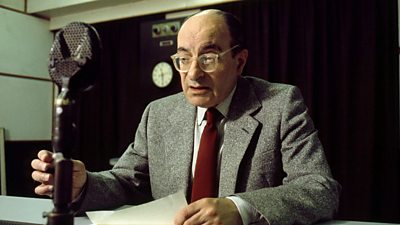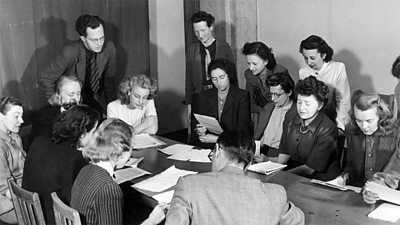The division of Europe between East and West, so soon after the trauma of the Second World War, secured the future of the ���˿��� language services to Europe, which until then had been in doubt. The failure of Britain, America and France to agree a post-war settlement with their former ally, and the Soviet Union’s control over the countries of Central and Eastern Europe made broadcasting a vital tool of influence in the emerging Cold War.
On 8 January 1948, the British Foreign Secretary, Ernest Bevin, described for the benefit of his Cabinet colleagues the new reality they faced in Europe:
"It must be recognised that the Soviet Government has formed a solid political and economic block behind a line running from the Baltic along the Oder, through Trieste to the Black Sea. There is no prospect in the immediate future that we shall be able to re-establish normal relations with European countries behind that line."
Editorially independent but funded by a government Grant-in-Aid administered by the Foreign Office, how should the ���˿���’s External Services, which broadcast in over twenty languages to Europe, respond to this strategic challenge? As in the Second World War, it was quickly realised that broadcasting would have a vital part to play in “letting in daylight from the whole of the outside world”. This was explained in a ���˿��� memorandum submitted to the Cabinet Committee responsible for Britain’s overseas information policy in 1950.
"The Overseas Services of the ���˿��� provide one of the most effective instruments for use by this country in maintaining the stability of the free world in the present struggle with Russian Communism. This struggle, often called the “Cold War”, seems likely to be long. It cannot be won quickly, though it might quickly be lost."

The communist coup in Czechoslovakia in February 1948, the Soviet blockade of Berlin in June and the subsequent allied airlift publicly demonstrated the growing antagonism between East and West. As the idea of a “cold war” became a reality, so the ���˿���’s rhetoric in broadcasts over the Iron Curtain hardened. However, despite Foreign Office objections, the Director of External Services at the time, Ian Jacob, was adamant that this should not be used as an excuse to avoid reporting controversy at home in overseas output.
"Conflicting opinions which have serious backing in this country should be allowed expression in proportion to the weight of this backing. Apparent contradictions that may arise from presenting these views helps to demonstrate the tolerance which is a cardinal feature of British democracy."
While ���˿��� foreign language broadcasting had begun before the Second World War, a ���˿��� Russian Service wasn’t launched until 1946. But where the Foreign Office pressed for hard-hitting broadcasts in Russian programmes, attacking and denouncing the actions of the Soviet Union and its propaganda activities, the ���˿��� resisted, warning against “thinking too exclusively in terms of counter-propaganda”.

This dispute came to a head in the pages of The Spectator magazine in 1957, involving accusations that the ���˿���’s inability to ‘offend totalitarian susceptibilities’ made the Russian Service a ‘notorious waster of time’. What followed were a series of letters, from a number of academics and Soviet scholars, echoing the views of the Foreign Office and criticising the ���˿��� for being far too sympathetic to the Soviet Union. The focus of their displeasure was the Head of the Russian Service, Anatol Goldberg, as his successor Alexander Lieven explains in this clip from the ���˿��� Oral History Collection.
In his broadcasts Goldberg spoke to listeners as a “disillusioned friend”, but in the face of this criticism he was removed from running the Russian Service and became, less controversially, its Chief Commentator continuing as the most celebrated of the ���˿���’s broadcasters behind the Iron Curtain.

Soviet jamming of Russian language broadcasts began in 1949, extending to all Central and Eastern European services the following year. This presented the ���˿��� with a fundamental problem: could anyone hear its programmes?
Evidence of audiences behind the Iron Curtain was notoriously hard to get. By 1951, a ���˿��� audience research report noted that “no hard evidence of continued listening” had reached the ���˿��� that year. Yet, the chance that some broadcasts got through offered sufficient hope to continue. However, as Alexander Lieven noted, beating the Soviet jammers became something of a game of cat and mouse.
The politically sensitive nature of broadcasting in Russian to the Soviet Union continued to have an impact on editorial decision-making. This was the case following the defection to the West of Svetlana Alliluyeva, Stalin’s daughter, in 1967.
A decision was taken to broadcast a long “letter” she had written after her defection (which had been published in Atlantic Monthly), comparing her own experience with the characters in Boris Pasternak’s Doctor Zhivago. But, as the Head of East European Services Maurice Latey describes, its broadcast coincided with an emergency visit to Moscow by the British Foreign Secretary.
It was left to the Head of the Russian Service, Alexander Lieven, to read an on-air statement explaining why the ���˿��� had decided to postpone the broadcast of Svetlana Alliluyeva. Lieven, however, refused to present this as a ���˿��� decision and instead explained that it was being postponed “on the instructions of the British government”. It was a potentially career-ending risk but, as he notes in this interview, it was for him “a matter of principle”.
The autonomy granted overseas staff was, in the early years of the Cold War, fairly limited. Even the job title of ‘Translator/Announcer’ indicated their dependency on other parts of the External Services machine. News and most current affairs were produced centrally and distributed for use in the language sections, whereas there was greater scope to develop ‘Features’ within services, if there was the capacity to do so.
However, the arrival of a new generation of international staff from Central and Eastern Europe in the 1970s and 1980s led ���˿��� management to consider how working practices could be adapted to take advantage of the quality and dynamism of this new cadre. As Peter Udell, Controller of European Services, recalls, it required the language services to stop simply being “translating machines” and generate more original output.
It was a similar experience for Elisabeth Robson-Elliot, working in the ���˿��� Russian Service at the time. Moreover, it wasn’t just a top-down exercise: there was pressure from new staff who expected to behave as any other journalist in the ���˿���.
This was an important change in the culture of overseas broadcasting that characterised the activities of the ���˿��� External Services, collectively known from 1988 as the ���˿��� World Service, in the later years of the Cold War. It also reflected the evolving nature of broadcasting over the Iron Curtain and the shifting geopolitical, editorial and cultural contexts through which the ���˿��� operated. But to what effect was all this effort made? For the Head of the Polish Section, Eugeniusz Smolar, it was about challenging Soviet hegemony and providing a different world view:
"We represented the quality, the fairness, the openness and, most important, we represented the alternative. When the communists wanted to persuade everybody there is no alternative, there was. The alternative was us."
Written by Dr. Alban Webb, University of Sussex.

